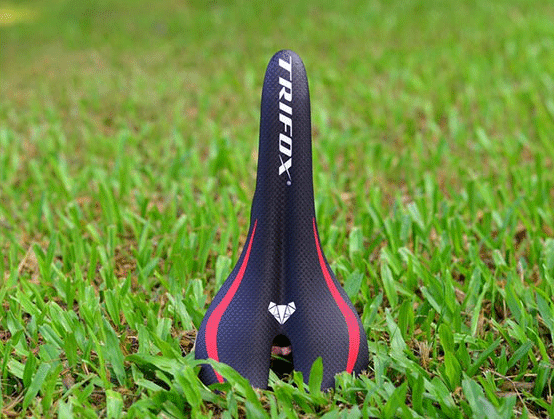
Why are bicycle seats so hard? For example, when you sit directly on a stool, the two sit bones in your butt bear your weight. At this time, the soft tissue in the middle of the two ischial bones bears less pressure. If you place a cushion between your butt and the stool, the two sit bones will press the cushion down with greater pressure, and the soft tissue in the middle will also bear more pressure, which is especially important in bicycle seats. Thicker saddles tend to put more pressure on your soft tissues, especially on long rides (it’s not a big problem on short rides). An over-padded saddle is also a common cause of painful inner thigh chafing as you ride longer. Wide or narrow? The width of the bicycle saddle is also very important to the rider. The width of the saddle is often determined by the distance between the two sit bones. If the saddle is too narrow, the sit bones will hang off the sides of the saddle and the soft tissue will bear a greater load. If the saddle is too wide, it can easily cause chafing on the inner thighs, especially in hot weather. The appropriate width of the saddle is also related to improper adjustment of your saddle. If the stem is too long and the handlebars are extended too far forward, or the saddle is positioned too far back, it will make the saddle look narrower. Conventional wisdom holds that women’s sit bones are farther apart, so men’s saddles are usually narrower than women’s saddles. Of course, individual differences are different, and the requirements for saddle width are also different. Measure sit bones How to measure ischial distance? Find a larger piece of corrugated paper, sit vertically on the corrugated paper, and finally use a ruler to measure the distance between the two deepest points, which is the distance between your sit bones. In addition to the distance between the sit bones, the size of the saddle also includes factors such as riding posture. Different riding postures will cause different pressure points on the saddle. Therefore, 3D printing technology is very popular in the manufacturing of bicycle saddles. . The following is selle royal’s reference data for different riding positions. According to the distance between the sit bones, the saddles are divided into three categories: small, medium and large. The corresponding ischium widths are less than 11cm, 11-13cm, and more than 13cm respectively. Athletic position (body at a 45-degree angle). 289mm*127mm (small, length times width), 289*144 (medium), 289*159 Relax posture (body at a 60-degree angle). 289mm*141mm (small), 289*161 (medium), 289*178 Relaxed position (body at a 90-degree angle). 289mm*169mm (small), 289*196 (medium), 289*224 One saddle can hold up an ordinary bicycle, especially saddles customized for professionals. They are often designed with various ergonomics in consideration of various riding postures, and are the best protection for the rider's body. A stiffer saddle may be uncomfortable, but it often better protects soft tissue from greater damage.
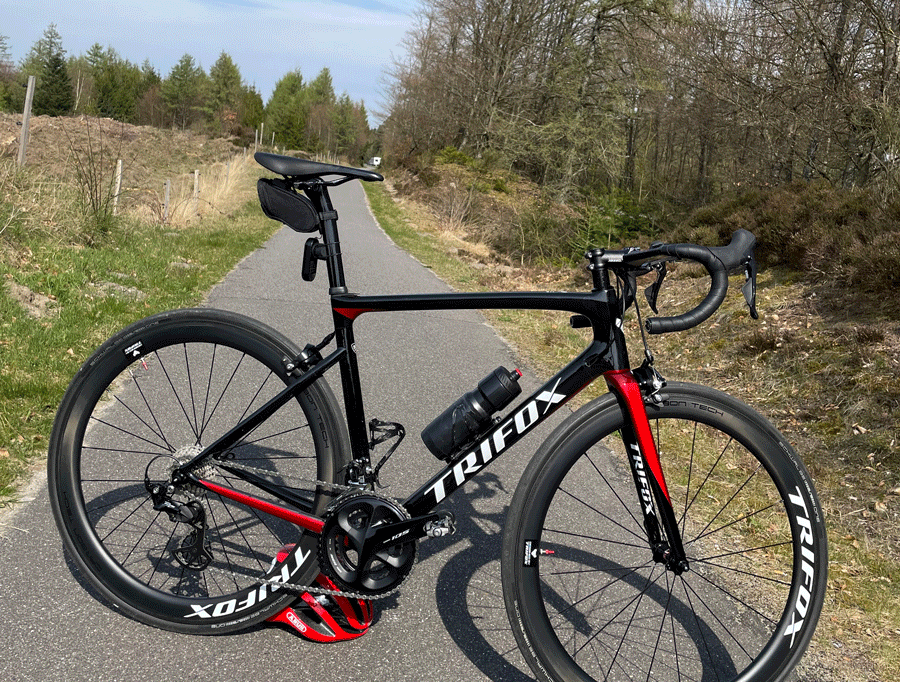
The vehicle you ride on is a precision machine, and it can perform optimally only when all parts are in good condition. However, we often only focus on the appearance of the vehicle and ignore many important components. Today, let us follow the article and take a look at those bicycle accessories that are easily overlooked. Wheel bearings: When we ride, if we find that the wheel set does not rotate smoothly, it is likely that the wheel set bearings are too dry or small stones have entered the wheel set. Failure to perform lubrication and maintenance for a long time may damage the entire hub or wheel set, causing greater losses. Therefore, we need to apply lubricating oil to the bearings regularly to keep the hub smooth. Chain: The chain is also a part that we often overlook. Its degree of wear is closely related to riding habits and environment. Improper shifting operation and improper cleaning may cause damage to the chain. Therefore, we need to pay attention to the status of the chain at all times and add appropriate lubricating oil to make the chain run smoothly. At the same time, the chain gauge should also be used regularly to check the expansion and contraction of the chain. If the gap is too large, the chain needs to be replaced. Control wiring harness: The wiring harness of a bicycle includes transmission cables and brake cables, and the status of these wiring harnesses is often ignored by us. Over time, these wiring harnesses may age and wear out, causing smooth operation. Therefore, we need to check the conduit for signs of kinks and wear and replace it if necessary. At the same time, you can also try to drip some chain lubricant and other grease into the wire tube to improve the problem of wire harness jamming. Transmission hanger: If your bicycle is prone to derailment or deviation, you should check whether the transmission hanger, guide wheel and other related parts are working properly. Problems such as deformation or bending of these components may cause certain problems in the transmission. Therefore, you must carry out relevant inspections before riding to ensure that the vehicle is operating normally. Brake disc: Brake discs are also one of the components that people tend to overlook. Its condition directly affects the performance and safety of the brake. If the disc is worn or deformed, it may lead to increased braking distance or brake failure. Therefore, we need to regularly check the condition of the brake discs and replace seriously worn discs in a timely manner. In short, riding a vehicle requires us to always pay attention to and maintain the status of each component. Only by doing routine maintenance and inspections can the good operation and safety of the vehicle be ensured. Brake pads have certain wear indicators. When the wear reaches a certain level, the braking efficiency will be reduced or failure. The disc may also be deformed or cracked after a crash. Once these problems are discovered, they need to be adjusted or replaced in time. The leading handlebar is an important component for controlling the direction of the vehicle, especially the carbon fiber handlebar, which requires regular attention and inspection. The handlebars of road bikes are often wrapped by various handlebar tapes, but under the shiny handlebar tapes there may be unsafe factors caused by corrosion or crashes. If not discovered in time, it may cause serious consequences. Therefore, regular attention or a thorough inspection every time the handlebar tape is replaced is recommended. Headset problems can also cause poor steering, possibly due to rough bearings and erosion caused by water stains, rust, etc. Frequent inspection is required. It is best to remove the handlebar and front fork, check the relevant sealed bearings, and apply lubricating oil for lubrication. If the bearings are damaged, they need to be replaced in time. The pedal is also a component that is often overlooked. You need to pay attention to whether the pedal rotates smoothly, whether the bearings are tightened, and whether the pedal body is solid. Tire inspection is also a very important part of riding. It is necessary to check the degree of wear and possible puncture. Carefully observe the tire tread and sidewall. If cracks, punctures, etc. occur, they need to be replaced in time.
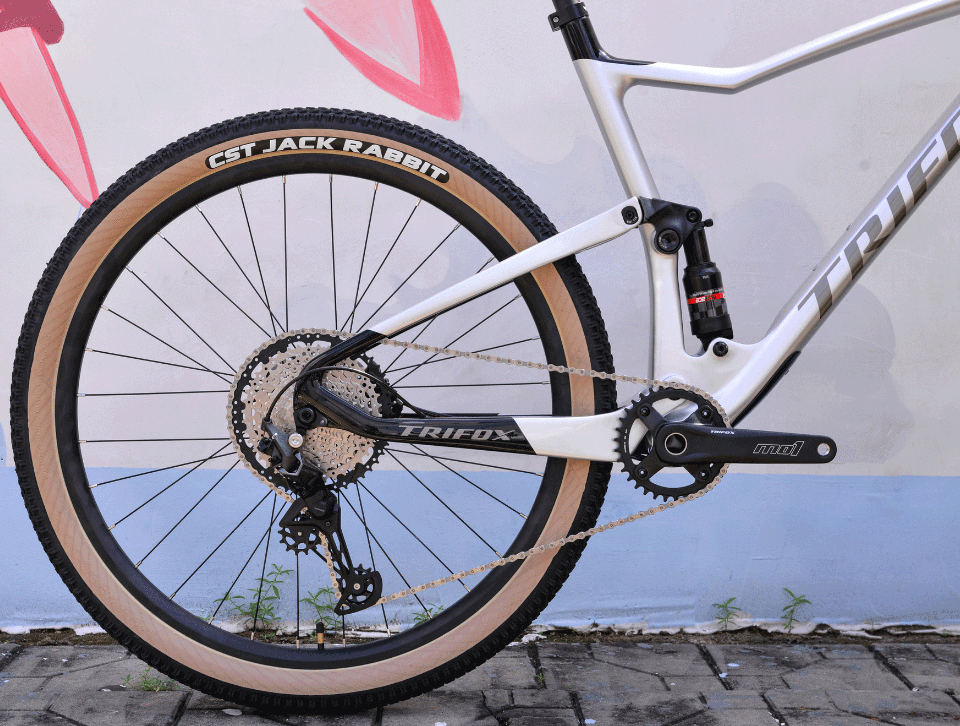
Many people mistakenly believe that bicycles are equipped with transmissions to speed up riding. Even when buying bicycle, they judge the speed of the bicycle based on 24-speed, 30-speed, etc. In fact, the maximum power a person can produce is only 0.4 horsepower. The transmission is just a tool to help people bring out the maximum horsepower easily. Generally, bicycles are used in cities, and there are actually many slopes in cities. For example, sometimes when you are riding a bicycle, you will feel that your pedals suddenly become heavier, and there are often many slopes that cannot be judged with your eyes. At this time, the role of the transmission can be fully reflected. If there is a transmission, you can ride easily as long as you can change to a lighter gear. Of course, this method can also be used when there is a headwind. The advantage of the transmission is that it can help you effectively reduce your physical exertion when your physical strength is not good. For example, when you have a cold, your physical exertion should not be too great. If you choose lighter gears when riding, you will feel more relaxed. There are also women who are in poor health, students who are tired from exams, older people, etc., who can all use bicycle derailleurs flexibly, so the benefits of derailleurs are indeed too many. Operate shifting gears correctly and efficiently If the gear is too light, the rider's pedaling force will be uneven. If the leg force is too heavy, the rider's buttocks will not be able to sit stably on the seat cushion, causing the so-called "hip jump". In addition, due to excessive leg force, the pedaling posture changes, affecting the smoothness of the pedaling action. There are also many beginners who lack training at the beginning and lack sufficient muscle endurance in their legs. Although they use too heavy a gear, It can move forward with greater power, but because the muscles cannot withstand the pressure, sports injuries such as knee joint or muscle strains may occur. Beginners should measure their own physical condition and not forcefully ride in heavy gears in pursuit of speed. Traveling over long distances. "Match appropriate gear ratios for different road conditions" When some beginners choose a vehicle, they often like to adjust the gear ratio of the front and rear chainrings according to their own riding habits and preferences, but we should choose the one that suits our own preferences and achieve the most efficient pedaling output. Novices often change gears immediately when they see a big slope and use a smaller transmission ratio. This directly leads to a sudden increase in frequency. When the muscles have not adapted, they will immediately feel muscle fatigue, and because the gear ratio is too light. , will cause an immediate decrease in speed. When other riders overtake, it will also cause the frequency of the legs that have suddenly become tired to increase again. In this way, as long as one or two slopes are passed, the relatively small transmission will immediately show weakness, so the correct When changing gears when climbing a hill, you should start to feel the pressure on your feet as the car reaches the middle of the slope, and then start shifting. The adjustment range is generally 2 or 3 gears at a time, depending on the specific slope increase. This requires not only physical strength but also It requires experience. Standing pedaling can also provide greater speed in the early stages of climbing, and can delay the reduction of the gear ratio, giving your feet sufficient time to adapt to the frequency. "Detailed analysis of specific road conditions" level road On a flat road, the front chainring is usually a small chainring, and the rear chainring is mainly matched with a 17 to 21 chainring. If riding with a tailwind, the rider can adjust the front chainring to a large chainring, and the rear chainring can be Freely match to achieve the effect of high-speed cruising. sharp uphill When riding on flat sections, if there are sharp short slopes ahead, such as bridges, hilly terrain, etc. The rider can rely on the inertia of the riding surface to rush up. The front chainring can be maintained in the position of the larger chainring, while the rear chainring should change gears according to the road conditions. uphill Because on uphill sections, it will increase the burden on the rider's legs when pedaling, resulting in excessive leg resistance. At this time, you should adjust the gear of the rear disc. Use the adjustment method one tooth at a time to gradually find the most suitable gear. With subsequent riding experience, you can easily find the gear that suits you. When riding continuous uphill sections, the rider should change gears according to the terrain. Usually the front chainring is adjusted to a small gear, while the rear chainring is constantly changing gears to match the rapidly changing terrain conditions. downhill When riding continuous downhill sections, the first principle for beginners should be to maintain average pedaling efficiency and avoid affecting the vehicles behind. The front chainring can be adjusted to a large chainring, and the rear chainring can gradually lower the gear. Don't fail to adjust because of greed. If there is an unexpected situation or sharp bend and the brake is not enough, it may lead to serious accidents. In fact, there is no so-called correct time to change gears during riding. After all, everyone's physical condition is different. Riders should listen and feel the level of their own riding before changing gears. Simply put, if you feel resistance while riding, you should shift gears. If the pedaling is too heavy, you should adjust the gear to a lighter level, and vice versa. A well-fitting bike coupled with the correct riding posture will ensure you have a happy ride.
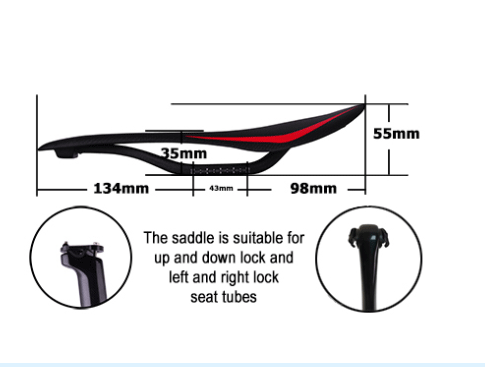
To outsiders, people who often ride bicycles usually have high saddles, but such a height is necessary in actual riding. Of course, this height may be an optical illusion. Bike design makes saddle look taller Newer road bikes often have tighter geometry, which means the top tube of the bike is sloping more downward. Such a compact body allows more of the seat post to be exposed on the top tube, making it look taller than older bikes. The handlebars of road bikes are particularly low. If there are two bicycles with the same height seat, the lower handlebar will obviously give people the illusion of a higher seat. The seats of ordinary riders look relatively high, which is largely a visual illusion. Similarly, the saddles of professional riders look higher, often because their handlebars are lower and their bodies are more compact. After all, the height of the saddle is determined by the length of the rider's legs. Two people with the same leg length will set the saddle height to the same height, while a bicycle with lower handlebars will appear to have a taller saddle. Bike seat height is important Your legs are weaker when your knees are bent, and stronger when they're almost straight. A lower bike saddle allows you to pedal with very bent knees, making riding at the same speed appear more strenuous. And a taller saddle (within reason) keeps your legs in a stronger, more comfortable range. Just like a squat, the further you go down, the more your legs will bend and the more tired you will feel. Shoes and pedals will also affect the seat height Riders with shoes and pedals have bikes that look taller. Because the cleats of lock shoes are often under the forefoot, connected to the lock pedal and fixed together. Recreational riders generally have the cleats positioned a little further back than the cleats of their shoes, which also causes the saddle of a rider with pedals to look a little higher. NOTE: For actual riding, you should keep the ball of your foot over the center of the pedal, even if you are not pedaling with shoes. Set the correct saddle height There are various professional and advanced technologies that can do a complete simulation test for you and customize a completely fitting height (accurate to the millimeter). As an ordinary person, there is no need at all, simple settings will do. When you get on the bike, place the balls of your back feet on the pedals and ride slowly. If your knees are fully straight and you still have some pressure on the pedals, then this height is almost the right height. If your knees are still bent, raise the saddle to adjust. If your heels aren't pressing into the pedals, or you have to tilt your butt to stay pedaled, lower the saddle a little. Many people are worried about bicycles. The seat is too high and their feet cannot touch the ground when parking. Therefore, when actually riding, if you want to park, you can park on the curb on the side of the road, or leave the bicycle to sit (standing after sitting for a long time can still Relieving the pressure on soft tissue) Standing parking is the safe and reliable way to park.
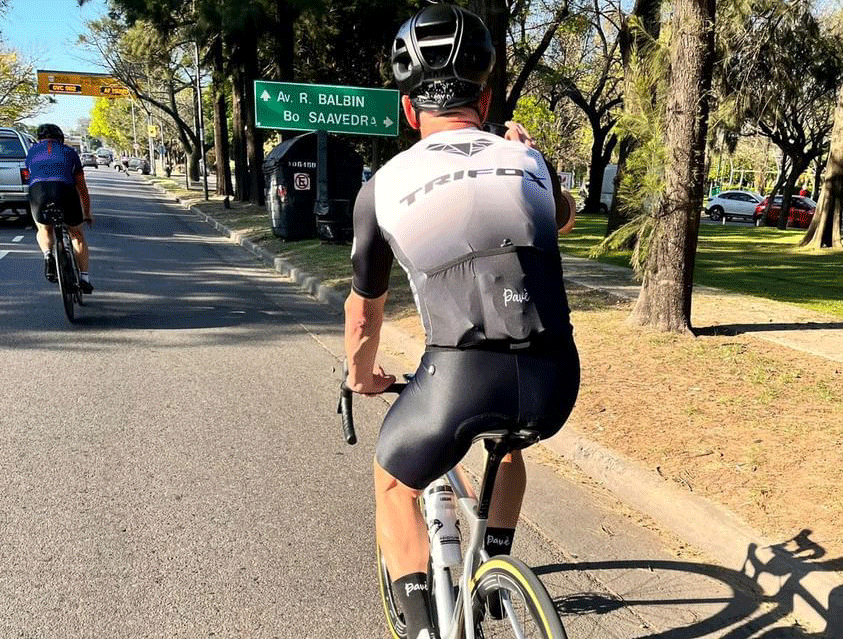
1. Promote cardiopulmonary health. Cycling, like running, is a very typical aerobic exercise. The biggest benefit of aerobic exercise is that it can enhance cardiopulmonary function. And during cycling, we need to breathe evenly to ensure the intake of oxygen. Increase lung capacity. Therefore, cycling is a good form of exercise to promote cardiorespiratory fitness. 2. Reduce the incidence of cardiovascular and cerebrovascular diseases. Cycling for a long time can increase the amount of hemoglobin in the body, improve the body's resistance, resist aging, improve the work efficiency of the cerebral cortex, and reduce the incidence of cardiovascular and cerebrovascular diseases. 3. Lose weight and relieve stress. Losing weight should be an eternal topic that we pursue. Because we sit in the office for a long time, cannot exercise, and face the computer for a long time, our shoulders and necks are sore, making each of us feel exhausted after work. Cycling can effectively alleviate this problem. Regular cycling is not only a good way to lose weight, but also because when riding, we need to look up at the road ahead, so that the cervical spine problems of those of us with bowed heads can also be effectively alleviated. Long-term persistence can not only achieve the effect of weight loss, but also relieve our tense muscles and relieve fatigue. 4. Shape muscles. Cycling can not only lose weight, but also improve and shape muscles, especially the lower body, calves, thighs and buttocks. 5. Relax your mind. Cycling is one of the few sports that allows you to free your mind while engaging in activities. When we are mentally exhausted or depressed, riding a bicycle on a beautiful road can relieve our entire depressed mood. Therefore, regular cycling is beneficial to reducing psychological stress and preventing depression. 6. Prevent high blood pressure. Cycling can prevent high blood pressure. Exercise can speed up blood circulation and reduce blood vessel pressure. It can also prevent hardening of blood vessels and achieve the purpose of lowering blood pressure. 7. Low-carbon and environmentally friendly, cycling can effectively reduce the use of bicycles, reduce exhaust emissions, alleviate air pollution, and at the same time reduce the use of cars, making roads less congested and smoother. 8. Increase oxygen intake. Cycling aerobic exercise can absorb enough oxygen and is an effective exercise to burn accumulated fat. 9. Anti-aging. We can find that cycling is a whole-body exercise. Both hands must hold the handlebars, and the feet must alternately pedal to move forward. The eyes must look ahead and the surrounding environment. Therefore, during the riding process, not only the body is exercised, but also the whole body is exercised. It improves coordination and trains people's reaction speed, so it can prevent aging. 10. Time freedom. As long as we want to ride, we can do it on the way to and from get off work, on weekends, etc., without having to worry about queues at the gym.
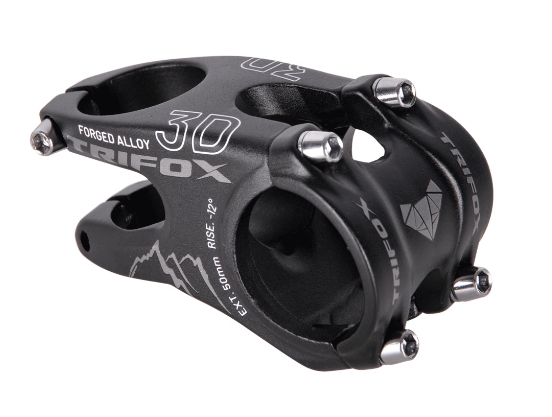
As a cyclist, the handlebar stem is an essential component of your bike. It connects the handlebars to the bike's steerer tube, allowing you to steer and control your ride. Whether you're an experienced cyclist or a newbie, upgrading your handlebar stem can make a significant difference in your rides' comfort and performance. 1. Lightweight and Durable This handlebar stem is made of 6061 T6 aluminum alloy, making it lightweight and strong. It weighs only 124g, making it an excellent option for riders who want to reduce weight and increase riding performance. Moreover, it's durable and offers excellent rigidity, ensuring that you'll always be in control of your ride. The stem has a 35mm handlebar clamp diameter and a 28.6mm steerer tube diameter, making it compatible with most mountain bikes. 2. Easy to Install One of the standout features of this handlebar stem is how easy it is to install. It comes with four screws that attach the handlebar to the stem, making the installation process easy and straightforward. This means that you won't need any professional help to install it and spend less time fiddling with your bike and more time riding it. 3. Better Performance The Lightweight 35mm Mountain Alloy Handlebar Stem ABS200 is perfect for off-road riding. It's stiff enough for uphill climbs and rough terrain yet has enough flex to absorb vibrations and impacts, providing a smoother ride and reducing rider fatigue. The stem's bolt-on faceplate design ensures the handlebars are secure and won't slip, even in the most challenging of conditions. This stem will provide you with better handling, control, and comfort on your rides. 4. Stylish Option The ABS200 stem has a sleek and minimalist design, adding style to your bike. It's available in black, gold, and red colors, providing you with the option to choose the color that best suits your bike's aesthetics. Its clean design complements most mountain bikes, giving your ride a unique and sophisticated look. 5. Affordability One of the standout features of this handlebar stem is its affordable price. With its high-quality materials and excellent functionality, it's an excellent option for riders who want to upgrade their ride without breaking the bank. It's an affordable investment in your ride's comfort and performance, making it an essential component of your mountain bike. Conclusion: Investing in a high-quality handlebar stem can make a significant difference in your ride's comfort and performance. The Lightweight 35mm Mountain Alloy Handlebar Stem ABS200 from Trifoxbike is the perfect handlebar stem for any rider, whether you're a newbie or an experienced cyclist. It's lightweight, durable, easy to install, and has an elegant and sleek design. Moreover, it's an affordable option, allowing you to upgrade your ride without spending a fortune. Upgrade your ride today with the best handlebar stem – the Lightweight 35mm Mountain Alloy Handlebar Stem ABS200!
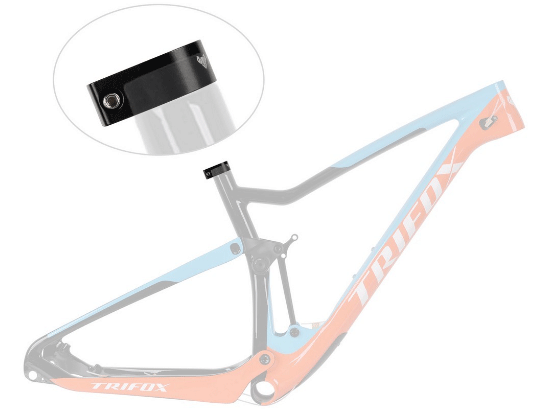
1. Durability: The MTB seatpost clamp SC35 is made from durable materials, including aluminum or steel. These materials are designed to withstand the vibrations and stresses of cycling, making them long-lasting and reliable. You can be sure that your seatpost will remain firmly in place throughout your ride, giving you a comfortable and stable experience. The durability of the MTB seatpost clamp SC35 makes it an excellent choice for trail riders, mountain bikers, and all other cyclists looking for a reliable seatpost clamp that can endure any challenge. 2. Easy to Install and Adjust: If you're like most riders, you don't want to spend hours fiddling around with your bike's components. Luckily, the MTB seatpost clamp SC35 is easy to install and adjust. The bolt or quick-release mechanism allows you to tighten or loosen the clamp easily, giving you complete control over your seatpost height and angle. Adjusting your seatpost has never been easier, making the MTB seatpost clamp SC35 a top choice for cyclists who love to fine-tune their bike's components for optimal performance. 3. Streamlined Design: The MTB seatpost clamp SC35's sleek design not only looks great, but it is also practical. Its streamlined profile reduces the overall weight of your bike, making it an excellent option for riders who want to cut down on weight without sacrificing durability or comfort. The seatpost clamp fits seamlessly with your bike's design, giving it a professional and polished appearance. 4. Compatibility: The MTB seatpost clamp SC35 is universally compatible with most bike frames, making it an excellent choice for every cyclist. Whether you ride a mountain bike, road bike, or hybrid bike, you'll be able to use the MTB seatpost clamp SC35 without any problem. This compatibility feature makes it an ideal product for those who have multiple bikes and want a versatile seatpost clamp that works with all. 5. Enhanced Performance: The MTB seatpost clamp SC35 is engineered to enhance your performance. The stable and secure seatpost allows you to ride with confidence, knowing that your seating position is optimized for maximum power and comfort. The clamp's stability reduces the chance of your seatpost shifting as you ride, giving you a more efficient transfer of energy to your pedals. These enhancements can be the difference between winning and losing, making the MTB seatpost clamp SC35 a top choice for competitive riders. Conclusion: The MTB seatpost clamp SC35 is undoubtedly the finest cycle seat clamp of 2023. Its durability, easy installation and adjustment, streamlined design, and compatibility make it stand out as an excellent choice for all riders. Whether you're a professional or casual rider, you can't go wrong with the MTB seatpost clamp SC35. It's a game-changer, and it will undoubtedly elevate your riding experience. Invest in the MTB seatpost clamp SC35 today, and you'll never go back to your old seatpost clamp again.
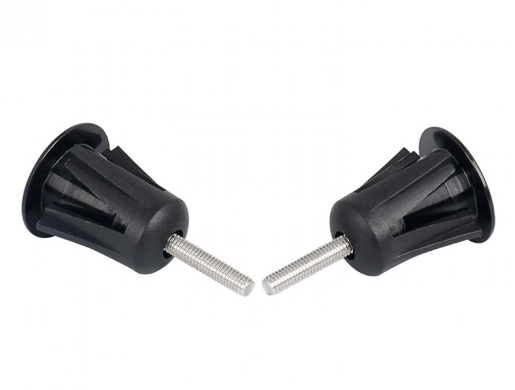
1. Superior Quality and Build Trifox Bike handlebar end stoppers boast premium quality and durability. Made of high-quality alloy material and CNC machined, these end caps are sturdy enough to secure your handlebar weights to prevent rattling and loosening during a ride. Furthermore, the ends are oxidized to create an elegant and durable finish, ensuring they serve you for years. 2. Uncomplicated Installation Trifox Bike handlebar end stoppers are an easy and convenient accessory to install. You can easily insert them into the handlebar ends without using any tools or adhesives. Their unique design ensures that they fit tubes with an inner diameter of 17-23mm, and once installed, they stay firmly in place. 3. Added Safety End stoppers are a crucial safety feature, especially if you have open-ended handlebars. They prevent your hand from sliding off the handlebar accidentally, thus preventing accidents that result from losing control of the bike. With Trifox Bike handlebar end stoppers, you're assured of enhanced security, even when riding on bumpy and rough terrain. 4. Lightweight Design Trifox Bike handlebar end stoppers have a minimalist design, which makes them lightweight. At just 24grams/pair, your bike's overall weight won't be affected by these end stoppers. Even better, their lightweight design reduces unnecessary weight around your handlebar, making your bike more aerodynamic. 5. Cost-effective Trifox Bike handlebar end stoppers are a cost-effective solution to an essential safety requirement in your cycling journey. They offer an affordable option to secure your handlebar's weights, preventing rattling that can lead to annoying noise during a ride. You can cycle confidently and smoothly with these simple accessories. Conclusion: Trifox Bike handlebar end stoppers are tiny, but their contribution to your cycling experience is significant. They provide enhanced safety, comfort, and stability to your bike's handlebar. Their high-quality build, lightweight, uncomplicated installation, and cost-effectiveness makes them a perfect addition to your bike. So, if you're looking to enhance your ride's security and comfort, visit Trifox Bike today and purchase handlebar end stoppers that'll never let you down.
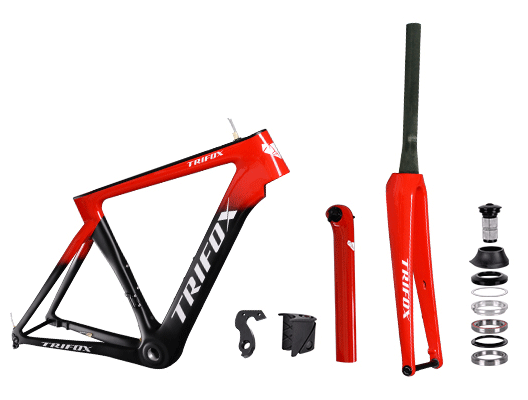
1. Understand Your Body Measurements To start, you need to understand your body measurements to determine the perfect fit for your 56cm road bike frame. Body measurements you need to know are your inseam and your reach. Your inseam is the distance between the floor and your crotch, while your reach is the distance between your fingertips when you stretch your arms out wide. You can use a tape measure to measure these data, then use an online bike fit calculator or visit a professional bike fitter to determine the ideal size for your 56cm road bike frame. 2. Consider Your Riding Style and Terrain Secondly, consider your riding style and the kind of terrain you'll be cycling on. If you're planning to use your road bike for long distance touring or leisurely rides, you'll want a more comfortable and stable frame that offers a relaxed geometry. On the other hand, if you're a competitive cyclist who participates in races and time trials, you'll want a more aggressive frame that has a steeper geometry, which allows for better aerodynamics and faster speeds. 3. Look for the Right Materials The material of the frame affects the overall riding experience, comfort, durability, and cost of the bike. Aluminum frames are the most affordable, lightweight, and stiff, but they can be uncomfortable and transmit more road vibrations. Carbon fiber frames are the most expensive, lightweight, and comfortable, and can dampen vibrations, but they're not as durable and can crack or splinter if damaged. Steel frames are the most comfortable, durable, and affordable, but they're also the heaviest and have more flex, which can affect performance. 4. Check the Frame's Components Before buying your 56cm road bike frame, make sure to check its components, such as the bottom bracket, headset, dropouts, and forks. The bottom bracket is where the crankset and pedals attach to the frame, and it affects the stiffness and power transfer of the bike. The headset connects the fork and the handlebars and affects the steering and handling of the bike. The dropouts hold the rear axle and affect the wheel alignment and spacing. The fork holds the front wheel and affects the comfort, handling, and weight distribution of the bike. 5. Test the Frame Before Purchasing Although you can find many high-quality 56cm road bike frames online, it's important to test the frame before committing to the purchase. A test ride can help you feel the bike's geometry, stiffness, comfort, handling, and overall performance. You can try different riding positions, shift the gears, brake, and corner to see how the bike responds. If possible, also consider getting a professional bike fit to fine-tune the frame's size and fit to your unique body type and riding style. Conclusion: Choosing the perfect fit for your 56cm road bike frame requires considering your body measurements, riding style, terrain, materials, components, and testing the frame. Don't rush the decision and take the time to research, try out different frames, and seek professional advice if needed. A well-fitted road bike frame can provide you with countless hours of enjoyment, fitness, and adventure. Happy cycling!

















